

How to Approach the TSA Test in 2024: An Oxford Graduate’s Preparation Advice
This guide is written by Rhiannon (Experimental Psychology, University of Oxford graduate). Rhiannon leads you through her top tips for preparation, including how to approach the test, how best to structure your preparation, key aspects of critical thinking and problem solving and examination technique.
What is the Thinking Skills Assessment (TSA)?
The TSA is a test designed to assess your ability to critically analyse and make use of information. It requires both a logical approach to analysis, and creativity in being able to flexibly make hypotheses about the material given. It is currently required for entrance applications to a number of courses at Oxford, Cambridge and UCL universities: Experimental Psychology, Geography, Human Sciences, Philosophy, Politics and Economics, and Psychology, Philosophy and Linguistics . The TSA is specifically designed to assess the skills that are integral to success in these subjects.
The test is comprised of two main question types: critical thinking, and problem solving. The specific question types and skills assessed in these sections are discussed below. Importantly, there is very little specific knowledge that is required for this test. It is based around your ability to engage with and critically analyse information that is provided. However, you can and will improve your score with thorough preparation and a good understanding of what the questions are asking you.
What is it assessing, and why?
Critical thinking is a key part of university study. Rather than simply reading and absorbing large volumes of information, it is important to be able to assess them for their true meaning. If you read an opinion piece, even from an expert in the field, it is important not just to take it at face value. Upon analysing the structure of an argument, you may find it to be flawed. You may identify that an argument rests upon some hidden assumptions, and that the argument itself is only true if these hidden assumptions are.
Being able to carry out such an analysis is a key part of university essay writing. In your own essays you will also be forming a series of arguments, often through an evaluation and assimilation of the views of others. It is helpful to be aware of the structure of your own reasoning, whether there are any assumptions your argument is relying upon, and if so whether these assumptions will hold. This will make your own arguments more compelling.
Critical Thinking for the TSA
The critical thinking section is based around the appraisal of arguments: examining the components of an argument to see if there are any flaws to it, and that undermine its conclusion.
A premise is something that must be true for an argument to hold. For example, in the argument ‘eating meat is morally wrong because animals are sentient beings’, the premise is that animals really are sentient beings. If they are not, or if their sentience is unknown, then the argument does not hold. When you are reading an argument, think about whether it relies on any particular premises for the conclusions to be true.
Alternatively, an argument may not stand because there is a flaw in its logic. There are a number of reasons for this. For example; sometimes an argument will mistake an association, or correlation, with causation. In the statement ‘people who go running regularly live longer on average, therefore if I go running I will live longer’ it is assumed that because two things (running, and living for longer) are associated, one must cause the other. However, this is not necessarily true, as there may be other reasons for people who run regularly to live longer: for example, they may have had more money, more free time, or have been less likely to have a health condition that could interfere with running.
In the TSA, it is important to base your judgement only on what is given to you in the text. In the above example, you may be aware of evidence showing the running does in fact have a causal association with life expectancy, or you may suspect that it would do. However, this is different to a piece of information that is directly proven by the text.
When an argument is very long or wordy, it can be difficult to work out exactly what the structure of the argument is. It can be helpful to split an argument up into a particular form that you are familiar with, perhaps using arrows, or replacing elements of the argument with ‘A’ or ‘B’. In general, statements that follow words such as ‘so’, ‘thus’, or ‘consequently’ are likely to be the conclusion of the argument.
Problem Solving for the TSA
The problem solving component tests your ability to use information in a creative way. It requires logical and numerical skills applied to a novel situation. For example, you may be asked a question on how to organise multiple timings when cooking a meal, or how to transfer a certain volume of liquid given only a limited number and size of containers.
These questions are based around numerical concepts, so you may find it helpful to brush up on some simple mathematical concepts such as percentages and ratios . You may also find it helpful to practise mental arithmetic so that you can answer questions more quickly. However, remember the test is assessing your ability to problem solve rather than any complex mathematical knowledge.
If in doubt, go back to basics and remind yourself what the question is asking you to do. It may help to underline key words from the question stem if you are sitting a paper exam. It can also be very helpful to write down your thought process as you are working out an answer, so that you can go back and correct any mistakes or points of confusion that you come across.
You may find that there are several different ways of answering the question, and you are unsure which method is best. It is perfectly fine to try a number of different ways of coming to an answer by a process of trial and error : after all, this process of logical reasoning is a key part of what the test is assessing! However, be sure to keep an eye on the time and do not spend too long on the most difficult questions at the expense of the other ones. Remember, you can flag and go back to a question later on.
How should I prepare for the TSA?
Practise! Familiarise yourself with the different examples and past questions available online on the TSA website. Remember, although the skills assessed are abstract, you will improve through practice
Try to pick out examples of arguments in everyday life, and focus on attempting to analyse their arguments. What are they really saying (their conclusions)? Does the argument rely on any premises for the conclusion to be true?
Devise a strategy for managing your time. Depending on the type of question that you find the most challenging, you may not wish to split your time equally between the two sections. Make sure you are familiar with the way that you are going to manage your time, so that you aren’t caught out by the end
Make sure you are happy with the logistics of taking the test. Ensure you know the location of the test centre, and leave yourself plenty of time to get there. It is also important to check the identification documents that you need, and make sure you have these ready in plenty of time
Top Tips on the day
There is no negative marking, so make sure you always put an answer down, even if it is a complete guess
Pay attention to timings! Don’t be tempted to spend too much time on a particularly difficult question
Try to stay calm, and don’t panic if you are unsure of the answers. Remember, the test is supposed to challenge you, and there is no need to get every question right! Even the very best candidates will make errors and feel uncertain at times
How Can U2 Help Prepare You For the TSA & Wider Oxbridge Application (e.g. Personal Statement, Interview Preparation, Summer School, Research Projects)?
U2 offers TSA admissions test preparation either as part of our wider Oxbridge Mentoring programmes or as pay-as-you-go sessions ( book a free consultation to discuss options).
The Process:
1) We suggest an Oxbridge graduate/ TSA tutor in the student’s course of application as a mentor and send their full CV for review. Our tutors are deeply familiar with the admissions process and experienced in supporting students’ TSA preparation.
2) We typically suggest beginning with a 1.5 hour informal assessment/ taster session , where the mentor will informally assess the student’s current performance level for the TSA (and interview if interested in wider application mentoring). Following this, we issue a report with feedback, and structure a plan to best prepare.
3) U2’s approach for regular TSA sessions: We have linked an example TSA course structure curated for a student looking for a TSA to Interview preparation course ( link ). This is typically customised by the tutor chosen and individualised to the student and their particular requirements.
Frequency of sessions can be decided between student and mentor. Honing the skills necessary to succeed in the TSA test ideally requires long-term preparation.
Wider Application Support
U2's Oxbridge programmes aim to advance students to the level required for success through regular tutorial sessions and specific admissions preparation (for personal statement, admissions test & interview). In sessions, students are expected to orally communicate, defend, analyse & critique ideas or solve problems, in conversation with the tutor, as in an Oxbridge tutorial. This readies students for the challenging entry process and provides them with the tools needed to stand out amongst other strong candidates.
We offer some of the most comprehensive support available at present, with an entire interactive online platform, Minds Underground™ , built to take care of all students' co-curricular needs in preparation for university application and future careers, including research projects, masterclasses and summer schools. U2 has a remarkable track record of success supporting students in entry to Oxbridge and currently work with over 20 schools in the UK and internationally to enhance their Oxbridge provision.
We would be delighted to support you through what can be a challenging, but incredibly rewarding process.
Sessions from £70/h, or we customise wider application programmes (quote on enquiry).
How to Approach the Cambridge MML Admissions Test: Our Updated 2024 Guide
How to approach history ib revision to achieve a 7: our updated 2024 study guide.
Thinking Skills Assessment (TSA)
This admissions test is taken for some Oxford courses. Last updated: 9 months, 2 weeks ago
Description
The TSA forms a key part of the admissions process for many courses at Oxford. It is a challenge. But it doesn’t need to be daunting. With a bit of preparation, you can familiarise yourself with the TSA and get ready for the exam - and maybe even improve your thinking skills a bit in the process!
How to Prepare
General information.
Here are some general resources related to the Thinking Skills Assessment (TSA). Use this page as a hub to branch off and use other resources!
The Thinking Skills Assessment is a paper-based test, divided into two parts: a 90-minute, multiple-choice Thinking Skills Assessment and a 30-minute writing task. Information from the Oxford Undergraduate Admissions website can be found here 🔗 🌟 and from the official TSA website here 🔗 🌟.
The TSA registration date this year is between the 1st of September and the 29th of September 2023, and the UCAS deadline is the 16th of October 2023. The TSA test date is the 18th of October 2023.
If you are applying for one of the following courses at Oxford, you will be required to take both sections of the TSA: Experimental Psychology 🔗 | Human Sciences 🔗 | Philosophy, Politics and Economics 🔗 | Psychology, Philosophy and Linguistics 🔗.
However, if you are applying for either Economics and Management 🔗 or History and Economics 🔗 you will be required to take only Section 1.
Section 1 is made up of 50 multiple-choice questions and aims to assess the following: problem-solving skills, including numerical and spatial reasoning; critical thinking skills, including the ability to understand an argument; and the ability to reason using everyday language.
Section 2 is a writing task that seeks to evaluate a candidate’s ability to organise ideas in a clear and concise manner, and communicate them effectively in writing. Questions are not subject-specific and candidates must answer one question from a choice of four.
( Source 🔗 Accessed: 18/07/2023 )
You need to be registered separately to UCAS. Please check the details and dates here 🔗.
Getting Started
TSA Introduction and Past Papers 🔗 🌟 Visit this page to find out more about the basics, like what this test is and if you’ll have to take it.
TSA Support Workshop webinar by Jesus College, Oxford 🔗 🌟 An introduction to the types of questions you may face in the TSA, along with suggestions on how to tackle them.
TSA FAQs 🔗 Have any questions? They might be answered here…
Taking the Plunge
TSA Specimen Paper 🔗 🌟 Try taking this specimen Section 1.
Explained answers to TSA specimen paper 🔗 🌟 Then go through your answers, right and wrong, and compare your reasoning to the explanations here.
Pushing for Progress
The TSA does not require a lot of learning and memorisation. In this way, it is not like an A-level. Content is not king; what matters is your ability to think quickly. You can improve this ability and prepare to exercise it within the specific constraints of the TSA, but you can’t really revise (study) for this test like you might for normal academic exams.
Probably, the best preparation is to take past papers in timed conditions, and then carefully go through your answers. Some people find it useful to note down the errors that they have made along the way.
Here are some other things you could look at to try to improve your score.
TSA question guide 🔗 This document is very useful. It gives a worked example of each type of Problem Solving and Critical Thinking question you will come up against in Section 1, as well as explaining the ‘mathematical knowledge and skills needed’ (on page 9). The maths you need isn’t advanced, but this list is worth checking if you haven’t done maths for a while.
Wi-Phi (Wireless Philosophy) Critical Thinking videos 🔗 These videos provide a fun and straightforward introduction to critical thinking, and may be useful in developing the skills you’re being tested on in the Critical Thinking questions.
‘How to Beat the TSA!!’ (Jesus College Oxford) 🔗 🌟 Dr Matthew Williams explains what the TSA is and why it exists, as well as providing some tips on how to do well in this test.
Similar Questions
The TSA past papers available online should give you more than enough practice material, but here are some others if you yearn for yet more!
BMAT Section 1 🔗 The newer BMAT papers are closest in format to the TSA.
Section 2: The Essay
For most courses at Oxford (but not all), you will also have to write a 30-minute essay as part of your TSA. It does not seem to be as important as Section 1, but it’s an unusually short amount of time and so probably worth practising if you get the chance. The content of your essay does not need to be incredible. The most important thing is to have a clear, logical structure.
Here are some resources to help.
TSA Writing Task Guidelines 🔗 🌟 This is a brief introduction to the writing task, written by Cambridge Assessment, which is a test of skills.
TSA Section 2: the half-hour essay 🔗 This document answers some questions about the essay section, as well as discussing three essay questions.
‘Write a Perfect TSA Essay!!’ (Jesus College Oxford) 🔗 Dr Williams has experience marking this section. Here is his advice on how to tackle it.
‘Admissions Test: How to write a timed essay’ (Jamie Miles) 🔗 🌟 This entertaining video provides a student’s perspective on how to tackle the essay section.
Tips and Tricks
Here are some more ideas that might be useful. But remember that they’re just personal opinions, so don’t take them too seriously :)
Related Subjects
Economics 🔗
Philosophy 🔗

How to Prepare for TSA Oxford
Thomas Babb
The Thinking Skills Assessment (TSA) is one of the stranger admissions exams offered at university level, in that there isn’t a subject-specific curriculum that you need to learn. Unlike the MAT or NSAA, you won’t have to learn a syllabus of information before this exam. Alternatively, it directly tests your ability to use problem-solving and critical thinking skills.
You must take the TSA test if you’re applying to Human Sciences, Philosophy, Politics and Economics, Psychology, Philosophy and Linguistics, or Experimental Psychology. Students that are applying for Economics and Management or History and Economics will only need to take the first half of the paper.
In this article, we’ll explain everything you need to know about TSA Oxford, helping you to prepare for the exam and arrive on exam day with a total understanding of what’s going to come up.
How is Oxford’s TSA Exam Structured?
The TSA is divided into two parts, consisting of a 90-minute Thinking Skills Assessment and a 30-minute essay-based task. In total, students will have two hours to complete the exam.
The two sections are very different, testing distinct thinking skills and challenging a student’s ability to organize ideas, use critical thinking skills, and find reason in language.
Section 1 of Oxford’s TSA
The first section of Oxford’s TSA has a total of 50 multiple-choice questions. Each of these questions tests a different skill, ranging from everything to numerical reasoning to understanding arguments and general problem-solving skills.
Within this section, marks are not deducted for any incorrect answers given, so it’s always a good idea to attempt all 50 of the questions on the paper. A standard exam will contain 25 Critical Thinking questions and 25 Problem-Solving questions. As the exam continues, the questions become harder, with the first being the easiest and the last being the most challenging.
In these circumstances:
- Problem-Solving - Refers to a student’s ability to gain insight into unfamiliar problems. All the questions are either about identifying similarity, finding procedures, or relevant selection.
- Critical Thinking - When constructing an augment, you must suggest reasons to satisfy your conclusion. In this exam, you’ll have to find conclusions and reasons that naturally concur.
Across these two segments, you’ll have to answer 50 questions.
Get expert help with the TSA
The world's leading online TSA tutoring provider trusted by students, parents, and schools globally.
4.92 /5 based on 480 reviews
Section 2 of Oxford’s TSA
The second section of the TSA focuses entirely on writing skills, with applicants having to create an essay in thirty minutes. This essay will be based on one of four different questions asked in the section, with the student only being allowed to write two sides of A4.
When deciding on a question, be sure to carefully read all of the questions in their entirety. If you don’t fully understand what a question is asking, then that is not the question for you. When reading through, if you’re torn between several possible essays, then select the one that you believe has the more thought-provoking issues surrounding it.
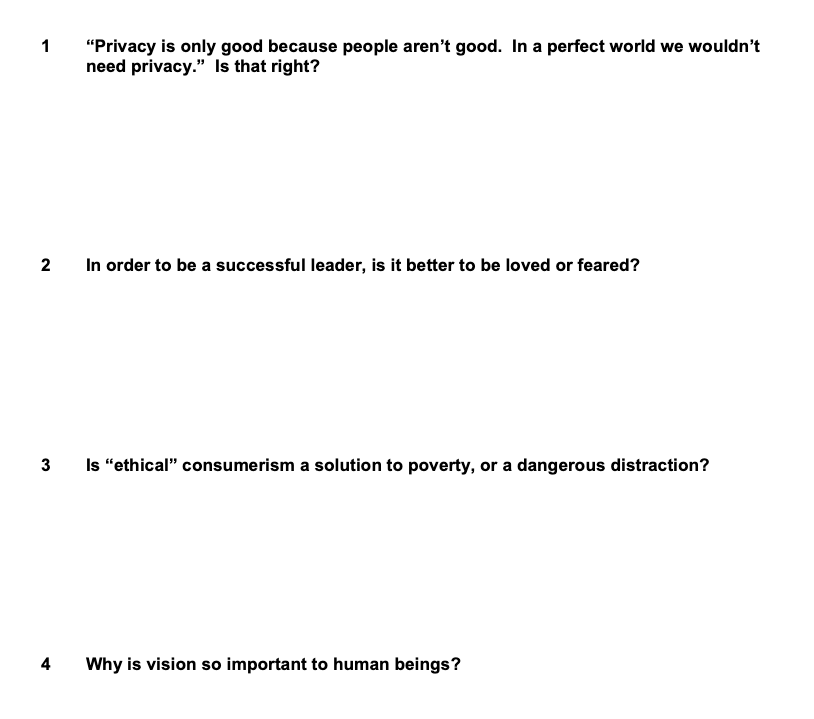
The essay should follow a typical structure that you’re used to in subjects like English Literature A-Level or History A-Level , moving through an introduction, body paragraphs, and a conclusion.
This section is slightly more straightforward, as it is only testing your ability to think quickly, formulate an opinion, and write a convincing essay.
How to Prepare for the Oxford TSA
As the skills and processes tested in Section 1 and Section 2 of the TSA are so different, we’ll split up our revision and preparation tips into specific sections.
How to Prepare for TSA Section 1
The first section of the TSA can be complicated for students that aren’t used to the paper. The skills needed to perform well are actually fairly simple, but they are something you need to practice if you want to be able to access them quickly.
The single best way to get better at the skills needed in TSA Section 1 is to do past papers. Going through the last couple years of past papers will allow you to attempt hundreds of questions, helping you to build up your critical thinking and logic skills over time.
Be sure to work methodically through the questions, then using the mark scheme to find exactly where you went wrong. You’ll also be able to see the answer, helping you to then work backwards and understand what you missed. Over time, this will build up your speed and efficiency in this section.
How to Prepare for TSA Section 2
The essay writing section tests your thinking skills and the ability of a student to rapidly come up with a nuanced argument. Due to this, there are a few ways of going about TSA Section 2 revision:
- Essay Practise - Just like for many humanities A-Level subjects, essay writing practice will ensure that you have a fluid command of language and are able to rapidly produce an essay.
- Past Questions - When reading through past papers, you’re likely going to pick one question out of the four. However, use the other three as practice, allowing you to test your abilities.
- Planning - Part of the test is being able to make a precise argument, which means you need to learn how to plan out several points rapidly. Practice with previous questions in order to develop this skill.
While you cannot radically train your thinking skills in such a short amount of time, approaching past papers and lifting questions for practice essays will be one of the best methods available.
Final Thoughts
The TSA exam is, so to speak, very thought-provoking. As a test that directly tests your ability to think logically, draw conclusions, construct arguments, and understand language, this is an exam that many find difficult to prepare for.
Alongside following our outlined revision tactics and tips for the TSA, we also recommend that you work with an online TSA tutor. At TutorChase , our top TSA tutors have all taken the TSA exam, having performed exceptionally well and landed a place at Oxford. With your tutor, you’ll be able to work through past papers, discuss exam technique, and get tips that will radically shift how you approach the exam.
If you’re sitting the TSA soon, then we wish you the best of luck!
Need help from an expert?
The world’s top online tutoring provider trusted by students, parents, and schools globally.
Study and Practice for Free
Trusted by 100,000+ Students Worldwide
Achieve Top Grades in Your Exams with our Free Resources:
STUDY NOTES
Expert-crafted notes designed to make learning the material engaging and clear.
PRACTICE QUESTIONS
Comprehensive questions to boost your revision and exam preparedness.
PAST EXAM PAPERS
Extensive collection of previous exam papers for effective revision.
Need Expert Help?
If you’re looking for assistance, get in touch with one of our expert tutors who will be able to provide you with the support you need for TSA . We’ll be there every step of the way!

Professional tutor and Cambridge University researcher

Written by: Thomas Babb
Thomas is a PhD candidate at Oxford University. He served as an interviewer and the lead admissions test marker at Oxford, and teaches undergraduate students at Mansfield College and St Hilda’s College. He has ten years’ experience tutoring A-Level and GCSE students across a range of subjects.
Related Posts

How to prepare for the UCAT

How to Prepare for the BMAT Exam

How to Prepare for the LNAT

Hire a tutor
Please fill out the form and we'll find a tutor for you
- Select your country
- Afghanistan
- Åland Islands
- American Samoa
- Antigua and Barbuda
- Bosnia and Herzegovina
- Bouvet Island
- British Indian Ocean Territory
- Brunei Darussalam
- Burkina Faso
- Cayman Islands
- Central African Republic
- Christmas Island
- Cocos (Keeling) Islands
- Congo, The Democratic Republic of the
- Cook Islands
- Cote D'Ivoire
- Czech Republic
- Dominican Republic
- El Salvador
- Equatorial Guinea
- Falkland Islands (Malvinas)
- Faroe Islands
- French Guiana
- French Polynesia
- French Southern Territories
- Guinea-Bissau
- Heard Island and Mcdonald Islands
- Holy See (Vatican City State)
- Iran, Islamic Republic Of
- Isle of Man
- Korea, Democratic People'S Republic of
- Korea, Republic of
- Lao People'S Democratic Republic
- Libyan Arab Jamahiriya
- Liechtenstein
- Macedonia, The Former Yugoslav Republic of
- Marshall Islands
- Micronesia, Federated States of
- Moldova, Republic of
- Netherlands
- Netherlands Antilles
- New Caledonia
- New Zealand
- Norfolk Island
- Northern Mariana Islands
- Palestinian Territory, Occupied
- Papua New Guinea
- Philippines
- Puerto Rico
- Russian Federation
- Saint Helena
- Saint Kitts and Nevis
- Saint Lucia
- Saint Pierre and Miquelon
- Saint Vincent and the Grenadines
- Sao Tome and Principe
- Saudi Arabia
- Serbia and Montenegro
- Sierra Leone
- Solomon Islands
- South Africa
- South Georgia and the South Sandwich Islands
- Svalbard and Jan Mayen
- Switzerland
- Syrian Arab Republic
- Taiwan, Province of China
- Tanzania, United Republic of
- Timor-Leste
- Trinidad and Tobago
- Turkmenistan
- Turks and Caicos Islands
- United Arab Emirates
- United Kingdom
- United States
- United States Minor Outlying Islands
- Virgin Islands, British
- Virgin Islands, U.S.
- Wallis and Futuna
- Western Sahara

Still have questions? Let’s get in touch.

TSA 2024: What is the TSA?
The Thinking Skills Assessment (TSA) is an admissions test used by Oxford to assess the problem solving and verbal reasoning skills of applicants to certain, usually essay-based subjects. It was previously administered by Cambridge Admissions Assessment Testing. However, in 2024 the University of Oxford announced that they would be implementing a new testing procedure. More information about this is due to be published in the Spring.
In this TSA guide article, we’ll explain everything you need to know about the TSA 2024.

Which Universities Require the TSA?
A two-hour test you’ll take before your admissions interviews when applying to certain courses. More information is available below.
The TSA UCL is a 90-minute multiple-choice test. It applies to applicants for European Social and Political Studies (ESPS) and International Social and Political Studies (ISPS). Candidates take the test in either January or March.
Who has to sit the Oxford TSA?
Applicants to Oxford for any of these subjects have to sit both TSA Section 1 and TSA Section 2:
- Experimental Psychology
- Human Sciences
- Philosophy and Linguistics
- Philosophy, Politics and Economics (PPE)
- Psychology and Linguistics
- Psychology and Philosophy
Applicants to Oxford for these subjects will have to sit TSA Section 1 only:
- Economics and Management
- History and Economics
So if you’re applying for any of these degrees, read on!
When are the TSA test dates in 2024?

For Oxford and Cambridge applicants, the actual TSA test date has not been published yet. It is likely that the test will take place at the end of October and you will need to have registered by the end of September. The deadline for applying for any modifications to the papers (e.g. enlarged print) if you need those will be sometime in the middle of September. Check out our article for more information on the Cambridge and Oxford TSA test date .
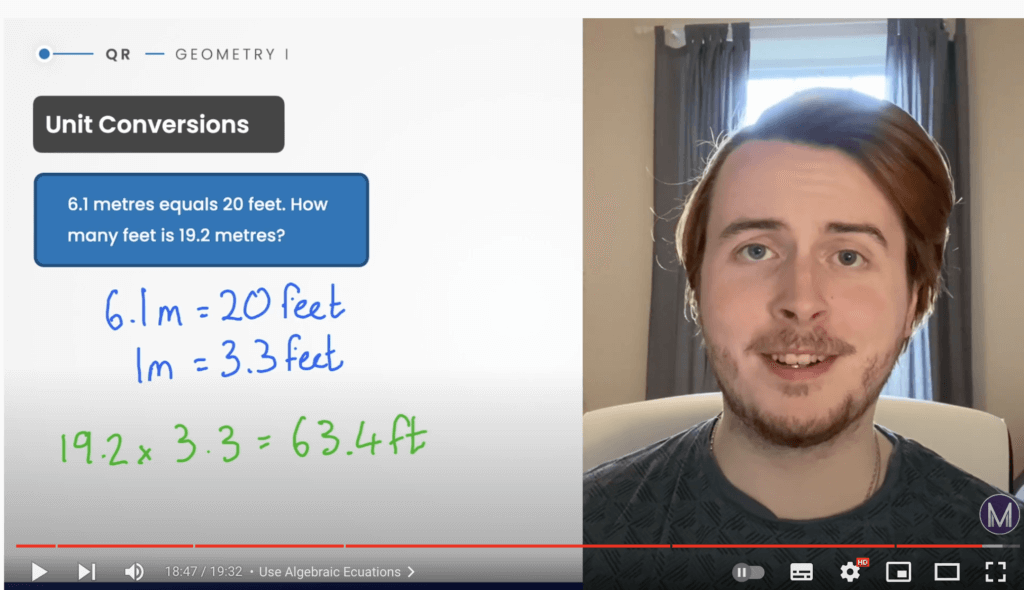
What format will the TSA 2024 take?

You will sit the TSA Oxford at a test centre, which may be your school or another open test centre if you cannot take it at a school. Our TSA Online Course is the perfect place to start understanding the format and question types in the exam.
TSA Section 1
Section 1 is a 90 minute, 50 question, multiple choice exam. The TSA questions consist of 25 problem solving questions, which will test your ability to reason mathematically, and 25 critical thinking questions, which test your verbal reasoning ability. The two question types will be mixed throughout the paper, and questions generally get harder as you go.
TSA Section 2
Section 2 is a 30 minute essay written from a choice of 4 questions, to assess your ability to structure an argument and communicate your ideas clearly, concisely and effectively. The essay questions are not subject-specific.
If you’re looking for a TSA study guide for preparing for Section 1 or 2, check out our TSA past papers for questions!
Where can I take the TSA 2024?
If you are taking the TSA Oxford, you’ll need to take it at an authorised test centre. Your school or college may already be one, and if not they can apply for this – speak to your Exams Officer to find out and register.
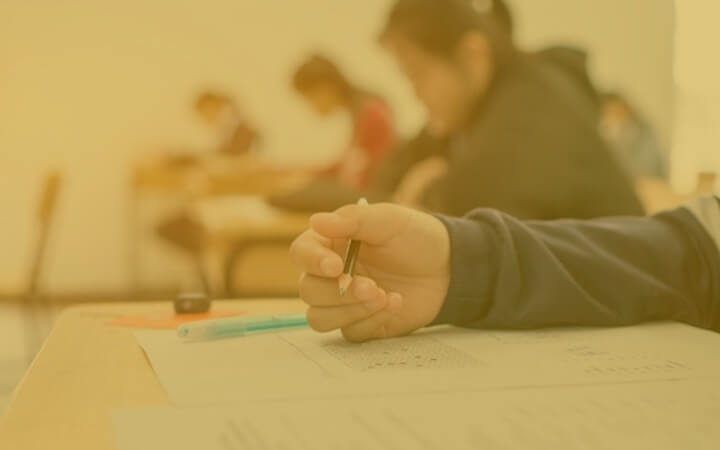
How much does it cost to take the TSA 2024?
Cambridge Assessment (who administered the TSA) did not charge candidates for the TSA. It is yet to be announced id this will change. However, your test centre may charge a fee to cover room hire, invigilation etc., so to find out if there will be any cost to you, speak to your test centre.

How is the TSA 2024 scored?
Tsa section 1.
One mark is awarded for each correct answer. The marks are then converted using some clever statistics (the Rasch statistical technique, if you’re interested) to account for question and overall test difficulty so scores are comparable. You’ll receive a score on a scale from 0-100. It’s designed so typical applicants (specifically those applying to these top universities) will score around 60. 70 and above is a comparatively high score and 80 and above is exceptional.
TSA Section 2
There isn’t really a standard way the essay is marked. A copy of it will be sent to admissions tutors considering your application for them to read and they will have their own way of marking or assessing your work.
Check out our article on ‘ What is a good TSA score ?’ for more information.
How will I know my TSA score?
For the Oxford TSA, you’ll get a sheet on the day with some information to keep safe, and in January 2025 (date TBC) you can view your score for Section 1. You probably won’t get any feedback on Section 2 as it isn’t centrally marked, it’s just read and assessed by admissions tutors. At interview, tutors may potentially discuss your TSA, so they may disclose your score or mention your essay then, but this is by no means guaranteed.
Can I retake the TSA?
You can’t retake the TSA within the admissions cycle you’re applying for. If you were unsuccessful with your application this year and decided to reapply in future, you would have to sit the TSA again.
The TSA is a very important part of your university application. Admissions tutors will use it to judge whether you have the critical thinking and problem solving skills to excel in your chosen subject at degree level. The TSA may seem daunting at first, but with preparation you will be able to rise to the challenge! Check out our other TSA guide articles and TSA top tips to learn more. We also offer 1-1 TSA tuition , and our expert tutors can guide you to TSA success!
→ What does TSA mean?
The TSA is the Thinking Skills Assessment, which is an aptitude test used in undergraduate admissions for some courses at Oxford. It tests problem solving, critical thinking and essay writing ability.
→ What does TSA stand for?
TSA stands for Thinking Skills Assessment.
→ What is the TSA?
The Thinking Skills Assessment (TSA) is an exam used for undergraduate admissions to some courses at Oxford. It has two sections. Section 1 is multiple choice and tests critical thinking and problem solving, and Section 2 is an argumentative essay.
→ Which universities require TSA for admission?
Several universities in the United Kingdom require the TSA as part of their admission process. Some of these universities include the University of Oxford, the University of Cambridge, University College London (UCL), and Imperial College London, among others.
→ What is the format of the TSA exam?
The TSA exam comprises two sections: Section 1 and Section 2. Section 1 is a multiple-choice test that assesses a candidate’s problem-solving and critical thinking skills. Section 2 is a writing task that requires candidates to write an essay on a given topic. The test duration is 2 hours and 30 minutes, and candidates must complete both sections of the exam.
→ How can I register for the TSA exam?
Candidates can register for the TSA exam through the official website of Cambridge Assessment Admissions Testing, which administers the test. The registration process typically involves creating an account, selecting the exam date and location, and paying the registration fee.
→ How can I prepare for the TSA exam?
Candidates can prepare for the TSA exam by studying relevant topics, practising past papers, and improving their critical thinking and problem-solving skills. It is also recommended to familiarise themselves with the test format and marking scheme.
Still got a question? Leave a comment
Cancel reply.
Save my name, email, and website in this browser for the next time I comment.
Personalised 1-1 tuition, tailored to your TSA needs by our expert tutors
A comprehensive online course to boost your TSA preparation! Written by our TSA experts
Prepare for your interview with the help of our expert Oxbridge tutors, who will personalise your sessions according to university and college
Related links
- FREE Applying to Oxbridge Course
- FREE TSA Past Papers
Book Your Consultation
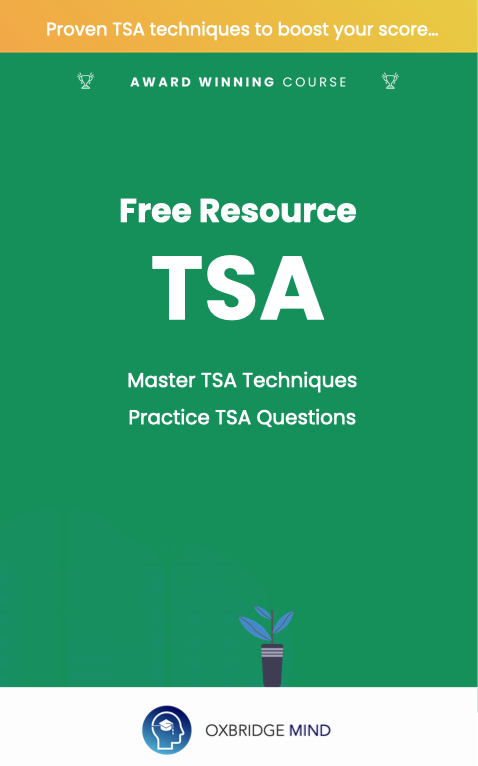
Searching . . .
Just start typing....
- Oxbridge Law 24/25 Entry
- Non-Oxbridge Law 24/25 Entry
- Oxford PPE 24/25 Entry
- Oxbridge Economics 24/25 Entry
- Oxbridge Modern Languages 24/25 Entry
- Cambridge Land Economy 24/25 Entry
- Oxbridge Psychology 24/25 Entry
- Oxbridge English 24/25 Entry
- Oxford Human Sciences 24/25 Entry
- Oxbridge History 24/25 Entry
- Oxbridge Geography 24/25 Entry
- Cambridge Philosophy 24/25 Entry
- Oxbridge Classics 24/25 Entry
- Cambridge Architecture 24/25 Entry
- Cambridge HSPS Programme 24/25 Entry
- Oxbridge Medicine 24/25 Entry
- Oxford Biomedical Sciences 24/25 Entry
- Oxbridge Engineering 24/25 Entry
- Cambridge Natural Science 24/25 Entry
- Oxbridge Maths 24/25 Entry
- Oxbridge Computer Science 24/25 Entry
- Oxford Physics 24/25 Entry
- Oxford PPL 24/25 Entry
- Cambridge Veterinary Science 24/25 Entry
- Oxford Chemistry 24/25 Entry
- Oxford Biology 24/25 Entry
- Oxford Biochemistry 24/25 Entry
- Non-Oxbridge Medicine 24/25 Entry
- Non-Oxbridge Dentistry 24/25 Entry
- IMAT Medicine 24/25 Entry
- Can’t Find Your Subject?
- Law Interview Programme
- PPE Interview Programme
- Economics Interview Programme
- Oxbridge Medicine Interview Programme
- Natural Science Interview Programme
- Engineering Interview Programme
- Maths Interview Programme
- Dentistry Interview Programme
- Medicine MMI Interview Programme
- Our Guarantee
Our Students
Student Success Stories
- University Access Scheme
- New Tutor Application Form
- Frequently Asked Questions
- How Does It Work?
- +44 (0) 208 068 0438
- [email protected]
SCIENCE PROGRAMMES (25/26 ENTRY)
HUMANITIES PROGRAMMES (25/26 ENTRY)
GET STARTED
Can't find your subject?
OXFORD TESTS (25/26 ENTRY)
CAMBRIDGE TESTS (25/26 ENTRY)
MEDICINE TESTS (25/26 ENTRY)
View Our Free admissions guides & resources
How UniAdmissions Cracked The Oxbridge Formula
Applying for Oxbridge is an opportunity seldom approached correctly. So how do you enter the top 16% of a strong cohort of applicants that get an offer? Discover how UniAdmissions get 2/3 of our students in.
When Do 2024 Medicine Offers Come Out?
When do UK Medical School Interviews start and when do they release their final offers to applicants? Find out all the dates for 2024 medical school admissions in this helpful guide.
Inside The UniAdmissions Portal: The UA Advantage
UniAdmissions students have access to the world's first dedicated Oxbridge admissions preparation platform, and this guide will help you discover exactly how the Portal will help you get your offer.
Discover all guides
ABOUT UNIADMISSIONS
Learn about who the world's first Oxbridge prep school are.
Learn about the Portal; the heart of our Programmes.
UniAdmissions' Foundation
The Foundation is our charitable arm to support disadvantaged students.
Students & Tutors
Discover who a UniAdmissions student is and our admissions criteria.
Learn about our high-performing Oxbridge tutors.
We're proud of our alumni. Read about their journey with UniAdmissions here.
Admissions Resources
Free Admissions Guides
Visit our Learning Centre and read our in-depth free guides.
We are the world's biggest Oxbridge application publisher. Learn more here.
Teachers Learning Hub
Learn about how to help your students get their place at Oxbridge.
Get Started
- Access Student Portal
- Oxbridge Programmes
- Open Day Webinar
- Tutor Application Form
- Common Questions
- Download Our Prospectus
- TSA Section 1: Critical Thinking | UniAdmissions Guide
Last Updated: 30th May 2018
Author: Cassandra Keller
- Admissions Test
Table of Contents
What does tsa critical thinking require.
TSA Critical Thinking questions require you to understand the constituents of a good argument and be able to pick them apart. The majority of TSA Critical thinking questions tend to fall into 5 major categories :
- Identifying Conclusions
- Identifying Assumptions and Flaws
- Strengthening and Weakening arguments
- Matching Arguments
- Applying Principles
Let’s take a deep dive into each category.
What is TSA Section 1?
Section 1 consists of 50 multiple-choice questions and assesses problem-solving skills , critical thinking skills , and the ability to reason using everyday language. The time allowed for this section is 90 minutes.
UCL only uses Section 1 of the TSA, whereas Oxford uses Section 1 and 2 for the majority of TSA degrees except for Economics and Management and History and Economics.
- TSA Results Guide
TSA Section 1: Identifying Conclusions
Conclusions are often confused with premises. For clarity, here is a definition of both:
- A conclusion is a summary of the arguments being made and is usually explicitly stated or heavily implied.
- A premise is a statement from which another statement can be inferred or follows as a conclusion.
- A conclusion is shown, implied or proven by a premise. Inversely, a premise shows, indicates or establishes a conclusion.
Consider this statement: My mom, being a woman, is clever as all women are clever.
Premise 1: My mom is a woman. Premise 2: Women are clever. Conclusion: My mom is clever.
This example is straight forward and the conclusion is explicitly stated, sometimes it might not be stated. Consider this statement: My mom is a woman and all women are clever. The same conclusion can be drawn from the statement.
Sometimes you will be asked to identify if any of the options “cannot be reliably concluded”. This is essentially asking you to identify why an option cannot be the conclusion. Some common reasons are:
- Over-generalising: My mom is clever therefore all women are clever.
- Being too specific: All kids like sweets so my son also likes sweets.
- Confusing correlation with causation: Lung cancer is much more likely in patients who drink water. Hence, water causes lung cancer.
- Confusing cause and effect: Lung cancer patients tend to smoke so it follows that having lung cancer must make people want to smoke.
- Why Does Oxford Use The TSA?
TSA Section 1: Assumptions and flaws
Other types of critical thinking questions may require you to identify assumptions and flaws in a passage’s reasoning.
- An assumption is a reasonable assertion that can be made based on the available evidence.
- A flaw is an element of an argument that is inconsistent with the rest of the available evidence. It undermines the crucial components of the overall argument being made.
Consider this example: My mom is clever because all doctors are clever.
Premise 1: Doctor’s are clever. Assumption: My mom is a doctor. Conclusion: My mom is clever.
Note that the conclusion follows naturally even though there is only one premise because of the assumption. The argument relies on the assumption to work. Remember that the assumption could also be a flaw. If you consider the statement above, what if the mother was not a doctor? This would result in a flaw.
Watch this video of Ankit, an experienced TSA tutor explaining identifying assumptions (taken from our TSA Online Course ):
TSA Section 1: Strengthening or weakening arguments
There is a holy trifecta to what strengthens an argument:
- Evidence : Arguments that are heavily based on value judgements and subjective statements tend to be weaker than those based on facts, statistics and available evidence.
- Logic : A good argument should flow and the constituent parts should fit well into an overriding view or belief.
- Balance : A good argument must concede that there are other views or beliefs (counter-argument). The key is to carefully dismantle these ideas and explain why they are wrong.
Thus, when asked to strengthen an argument, look for options that would increase the evidence basis for the argument, support or add a premise or address the counter-arguments. When asked to weaken an argument, do the opposite.
- TSA Section 2: Guide
TSA Section 1: Matching Arguments
Some questions will test your ability to identify similarities between two arguments about different topics. The similarity you are looking for is in the structure or the pattern of the argument. A question of this type will ask you to find the option that most closely parallels the format of the example argument.
TSA Section 1: Identifying principles
Some questions will require you to identify an underlying principle within an argument.
A principle is a general recommendation that can be applied to a number of cases. You are expected to extract the fundamental principle from the case presented in the passage, then see where this principle has been applied in other cases.
Looking to boost your TSA score?
The UniAdmissions TSA Programme will rapidly boost your score and triple your chances of succeeding in your application.
Our expert tutors will guide you through past papers in mock exam scenarios so that you are well-prepared by the time your exam comes around. UniAdmissions helps students refine and hone their abilities so that they’re exam-ready on test day for all aspects of the TSA exam.
UniAdmissions students placed at Oxford And Cambridge
Continue learning about Oxbridge...
9 ucat preparation materials to boost your ucat performance.
The UCAT is a test that can't be revised for traditionally, so you will be relying on the materials you…
UCAT Registration 2024 – What You Need To Know
Each year, thousands of medicine applicants will be sitting the UCAT with the hope of achieving a top score and…
10 Essential UCAT Keyboard Shortcuts
One of the greatest challenges in the UCAT is the time restrictions put in place for each subtest. You'll need…
5 Study Secrets From Actual Oxbridge Students
We reached out to some successful Oxbridge students to find out exactly what their study secrets are. Here's what we…
Cambridge announces the ESAT to replace the NSAA and ENGAA
In 2023, it was announced by the University of Cambridge that many of their established admissions tests would stop being…
Oxford Offers Second Admissions Test For 2023 Maths Applicants
After a large amount of complaints from students and schools regarding technical issues affecting Oxford's various computer-based admissions tests, the…
The Secrets to Oxbridge Admission.
- We cracked the Oxbridge formula . Find out what we discovered here.
- Looking for application support? Don't work with a random tutor. This is what you need to know first.
- Get up-to-date Oxbridge advice with our webinars. Follow our Open Days led by our experts and stay updated.
- Begin your Oxbridge journey with UniAdmissions through our programmes of support by clicking here.
How would you like to speak to an Admissions Consultant?
We use cookies to personalise your experience.

Thinking Skills Assessment(TSA): Ultimate Guide
What Does TSA Stand For?
Ah, the age-old question that many a university applicant has pondered upon: “What does TSA stand for?” No, it’s not an exclusive club or a secret society. The TSA, or Thinking Skills Assessment, is a crucial standardised test that has been the gatekeeper to some of the world’s most renowned universities.
Unveiling the TSA: Why is it Significant?
At its core, the TSA is more than just a series of questions on paper. It is a rite of passage for potential scholars. Designed to gauge your critical thinking and problem-solving abilities, this assessment stands as a testament to your readiness for rigorous academic challenges.
The reason why the TSA is held in such high regard is Simple. In a world teeming with information, universities like Oxford, Cambridge, and UCL are not just looking for students who can memorise facts. They seek individuals who can sift through information, discern truth from noise, and craft logical arguments — all skills that the TSA exam meticulously evaluates.
For many courses, the TSA is not just a recommendation; it’s a requirement. Your application to some of the most coveted courses at elite institutions could hinge on how you perform in this test. So, when we say the TSA carries weight, we mean it quite literally.
Whether you’ve just stumbled upon the term “TSA” during your university research or are actively prepping for it, understanding its essence is paramount. But fret not! This guide will demystify every aspect of the TSA, from its intricate structure to the secrets of acing it.
Objectives and Purpose of the TSA
The Thinking Skills Assessment goes beyond conventional academic metrics. Universities like Oxford, Cambridge, and UCL utilise it to identify candidates who can thrive in courses that demand analytical prowess, from Economics and Management to Experimental Psychology.
Eligibility and Course Requirements
Only specific courses at Oxford, Cambridge, and UCL require the TSA. Prospective students for Land Economy at Cambridge or Philosophy, Politics and Economics (PPE) at Oxford, among others, must undertake this assessment. It’s vital to check the requirements of the chosen course before preparing for the TSA.
Is TSA Good Internationally?
The TSA, though originating from the British academic system, isn’t confined to the UK’s borders. It’s an assessment that carries weight internationally. Students from all around the globe, aiming for a seat in elite universities, often find themselves brushing up their skills for the TSA. Its universal recognition underscores the importance of the skills it evaluates, making it a valued component of applications, whether you’re from the heart of Europe or the vast stretches of Asia.
Why is the TSA Essential for Universities?
The Thinking Skills Assessment (TSA) holds a pivotal role in university admissions, especially for world-renowned institutions. Here’s why:
TSA for Oxford University
At the University of Oxford, the TSA serves more than just an academic assessment. It’s an integral tool that aids the selection of students for various courses. The university uses TSA scores to ensure that applicants possess the depth of reasoning and analytical understanding required for their specific academic environment.
TSA for Cambridge University
The University of Cambridge, renowned globally for its academic excellence, uses the Thinking Skills Assessment (TSA) as a pivotal tool in its admissions process for certain courses. Specifically, applicants for the Land Economy course are required to undertake the TSA as part of their university application.
Unlike the Oxford version, Cambridge applicants do not need to complete the essay-writing segment.
The TSA for Cambridge, just like other universities aims to determine a candidate’s ability to think critically, understand arguments, and apply reason – essential skills for succeeding in the rigorous academic environment at the university. As such, the test is designed to evaluate abilities that aren’t always directly reflected in traditional exam results.
Other Universities and The TSA
While Oxford often garners attention regarding TSA requirements, other prestigious institutions like the University of Cambridge and University College London (UCL) also utilise this assessment. For example, Cambridge employs the TSA for its Land Economy applicants, whereas UCL mandates it for certain political studies courses.
By integrating the TSA into their admissions processes, these universities ensure they’re selecting candidates equipped with the intellectual skills needed for academic success.

The Formatting of TSA
The Thinking Skills Assessment (TSA) is meticulously structured to holistically evaluate a student’s reasoning and problem-solving capabilities. Understanding its format is crucial for prospective candidates aiming to tackle it effectively.
Duration and Content
The TSA is a robust test spanning 2 hours. Within this time frame, candidates are tasked with answering a diverse range of questions.
Detailed Breakdown
Section one.
This segment primarily assesses problem-solving and critical-thinking skills. It comprises 50 multiple-choice questions, and candidates are given 90 minutes to navigate through these. Each question in this section is valued at one mark, culminating in a total potential score of 50.
Section Two
Reserved exclusively for applicants to Oxford University, this 30-minute segment focuses on a student’s ability to articulate ideas in writing. Contrary to the multiple-choice format of the first section, this involves a writing task. Rather than being awarded a numerical score, this section is qualitatively evaluated by the admissions tutor, serving as an integral part of the overall application.

Scoring Dynamics
For those aiming for perfection, the maximum attainable score in the first section is 50, with each question carrying one mark. However, it’s important to note that while this section provides a numerical score, the second section doesn’t adopt a scoring system but is rather subjectively analysed.
Diversity in Format across Institutions
Though the TSA serves as a benchmark, there are variations in its application across universities. For instance, applicants to courses like Chemistry or History and Economics at Oxford only tackle the first section. Similarly, aspirants for the University of Cambridge and University College London must only complete the initial 90-minute section. So, it is extremely important to check the specific requirements for your choice of university, as well as the specific course you are looking to take.
What’s Challanging in TSA Exam?
The Thinking Skills Assessment (TSA) is often surrounded by an air of mystery, with many potential candidates wondering, “How hard is the thinking skills assessment?” In essence, the TSA is designed to be challenging, not because it seeks to stump students with complex mathematical problems or esoteric knowledge but because it dives deep into the part of your conscious that can’t simply be memorised. The test aims to gauge a candidate’s innate ability to dissect arguments, apply reason, and understand the nuances of various challenges.
But why is the TSA so difficult for many? The answer lies in its distinctive nature. Unlike many standard examinations that test rote memory or subject-specific knowledge, the TSA emphasises real-world scenarios, critical analysis, and logical reasoning. This means there’s no set syllabus and no predefined set of facts to memorise. Instead, candidates need to apply their general knowledge and cognitive abilities to answer questions. For many, this shift from traditional exam patterns can be daunting, making the TSA feel more demanding.
Moreover, prestigious institutions like Oxford and Cambridge have adopted the TSA precisely because they want to identify candidates who not only excel in their academic pursuits but also showcase exceptional critical thinking skills. These universities seek individuals who can adapt to unforeseen challenges, think on their feet, and offer innovative solutions – qualities that the TSA is meticulously crafted to assess.
In summary, while the TSA is challenging, it offers a unique opportunity for students to demonstrate their intellectual prowess beyond traditional academic metrics. If you’re gearing up for the TSA, embrace its distinct nature and focus on honing your analytical and problem-solving skills.
Preparing for the TSA
Stepping into the daunting world of the Thinking Skills Assessment (TSA) requires not just innate skills but also strategic preparation. Let’s dive into some pivotal questions and guidelines to help you gear up for the TSA.

Do you need to study for TSA?
Absolutely. While the TSA primarily tests your critical thinking and problem-solving skills, which might seem inherent, preparation can enhance your proficiency in these areas. Familiarising yourself with the exam’s structure, types of questions, and practicing time management can significantly increase your chances of success.
How do you prepare for TSA?
The TSA is distinct, and therefore, your preparation should be. Here are some steps:
– Understanding the Test
Start by understanding what the TSA measures. Dive into its objectives and the skills it aims to assess.
– Practice Regularly
Consistency is key. Regular practice helps you get comfortable with the test format and improves your response time.
– Review TSA Past Papers
Working on TSA past papers is invaluable. It gives you insights into the kind of questions you’ll face and helps gauge your preparation level. Remember, understanding the rationale behind an answer can be as crucial as the answer itself.
How to prepare for the TSA essay?
The essay section, specifically for Oxford aspirants, is about articulating your thoughts coherently. Here’s how to ace it:
– Read Widely
Familiarise yourself with various topics, from current affairs to philosophical debates. This will provide you with a broad perspective when presented with any essay topic.
– Practice Writing
Regularly write essays on diverse subjects, focusing on clarity, structure, and logical flow.
– Seek Feedback
Ask teachers or peers to review your essays, noting areas for improvement.
When should I start preparing for TSA?
The sooner, the better. Giving yourself ample time allows for consistent practice, understanding the test nuances, and building confidence. Ideally, starting your preparation several months in advance is beneficial.
Tips and Tricks: How do you pass a critical thinking test?
– stay calm.
Panicking can cloud judgment. Approach each question with a calm mind.
– Analyse, Don’t Assume
Read each question carefully. Make sure you understand what’s being asked before jumping to conclusions.
– Practice Logical Puzzles
Engage in activities that enhance your logical reasoning skills. Sudoku, logic puzzles, or brainteasers can be beneficial.
– Use the Method of Elimination
Sometimes, eliminating the clearly wrong answers first can simplify your choices.
Importance and Utility of TSA Past Papers
Past papers serve as a window into the TSA’s world. They offer insights into the exam pattern, difficulty level, and the variety of questions. Moreover, they’re a benchmark to assess your strengths and areas that need improvement. Regular practice TSA past papers will undoubtedly give you an edge in the actual examination.
TSA Results
Navigating through the post-exam phase can be as nerve-wracking as the preparation itself. The TSA, being an integral part of your university application, can have a substantial impact on your academic journey. So, understanding its results process and implications becomes paramount.
When, where, and how are TSA results announced?
The announcement of the TSA results varies depending on the university you’ve applied to:
Oxford University and Cambridge University
Results are typically released on January 11th, following the exam year. Candidates can access their scores by logging into the student portal designated for TSA results. Ensure you’re aware of any email notifications or guidelines your respective university might provide about the result date.
University College London (UCL)
Unlike Oxford and Cambridge, UCL does not release TSA scores to its candidates. Instead, the results are solely for UCL’s internal use in the admissions process. Hence, candidates may not receive a direct notification about their TSA performance.
How Long are the Results Available for Candidates?
For those universities that do release the scores, like Oxford and Cambridge, TSA results are available for a period of 60 days from the release date. This limited window underscores the importance of checking and saving your results promptly. After this timeframe, the results may no longer be accessible through the portal.
Importance and Interpretation of TSA Results
TSA results are a reflection of a candidate’s critical thinking and problem-solving skills—key competencies that leading universities seek. But what do these results signify?
Decoding the Score
The TSA score, especially for multiple-choice sections, is straightforward. Each correct answer contributes to your total score. However, remember, the essay section for Oxford is assessed qualitatively by the admissions tutor and doesn’t have a numerical score.
Benchmarking
Universities often have benchmark scores, either as cut-offs or as indicative scores, to filter candidates. This score varies yearly, depending on the overall performance of candidates. Ensure you compare your score with these benchmarks.
Holistic Application Assessment
While the TSA score is crucial, universities like Oxford, Cambridge, and UCL consider it as one component of your entire application. It’s juxtaposed with your personal statement, academic records, interviews, and other pertinent elements. Thus, a balanced profile can sometimes offset a slightly lower TSA score.
In conclusion, the TSA results, while central to certain university applications, should be viewed in conjunction with other elements of your academic profile. Understanding your score, its implications, and its role in the larger university admission process is vital for any TSA aspirant.
Applying for higher education can often become stressful and hard to manage among the array of tests, forms, and interviews, though it’s important to realise that the TSA test showcases abilities that universities deeply value and it’s important to keep that in mind.
If you ever find yourself looking for guidance through this overwhelming experience of applying, consider tutoring. Edumentors is a great platform for finding online tutors from top universities in the UK, they make sure to find a perfect match for you- someone who has gone through the same academic challenges you are currently experiencing. Therefore, these tutors are also great role-models , showing students that with the right mindset and a set of tools- success awaits!
The TSA presents its own unique set of challenges. Its format, which demands not just knowledge but the application of reason and logic, is what sets it apart. However, it’s this very challenge that makes the TSA so rewarding. It’s an opportunity to prove to yourself, and to your prospective universities, that you have the depth of thought, the analytical mind, and the determination required to thrive.
To all the prospective candidates out there: As you venture forth into your TSA preparation, let Edumentors’ tutors help and remember that while exhausting, it’s a valuable experience in and of itself. The skills you hone, the knowledge you acquire, and the challenges you overcome will shape you, making you better equipped for the academic world and beyond.
In the grand tapestry of your academic journey, the TSA is but one thread. Yet, it’s a thread that can add significant value, colour, and texture. Embrace the process, trust in your capabilities, and always remember – every test, including the TSA, is an opportunity for growth and learning. Best of luck, and may your TSA endeavours be fruitful!
- Thinking Skills Assessment

The Ultimate Guide to Grammar Schools in the UK

UK Education News – Week of September 10th, 2023
Find a tutor.
Online tutors from top UK universities
By submitting this form you agree to be contacted by Edumentors
Recent Posts

We are educating children from 11 different countries
Fill out this form to get matched with a tutor & book a free trial
Get matched with a tutor & book a free trial.

Consult with expert and request free trial session
Request was sent
Thank you for submitting the form. One of our team members will be in touch with you soon
- Telephone Tel: +44 (0) 20 7499 2394
- Email Email: [email protected]
Strategic Guidance
- Private Oxbridge Consultation
- International Oxbridge Consultation
- Postgraduate Applications Guidance
- Book a Complimentary Call
Comprehensive Support
- The Premier Service
- Oxbridge Preparation Course
Targeted Support
- Oxbridge Personal Statement Support
- Oxbridge Admissions Test Support
- Oxbridge Interview Preparation Support
Application Guidance
- ‘Aspiring to Oxbridge’ School Talk
- Teacher Training Workshop
- Individual Guidance Consultations
Personal Statement Support
- Personal Statement Group Workshop
- Personal Statement Consultations
Admissions Test Preparation
- Admissions Test Day
- Admissions Test Course
Interview Preparation
- Interview Preparation Day
- Interview Preparation Course
Free Library
- Oxbridge Interview Resources
- Admissions Tests Resources
- Student Library
- Teacher Library
- Keeping You Current
- Webinar Library
Our Publications
Course reports, oxbridge applications.
- Become A Tutor
- Our Offices
- Dukes Education
News & Press
- Widening Access
- Publications
- Sign In Register
- Sign In Register
TSA Oxford Tuition & Practice Tests
The Oxford TSA (Oxford Thinking Skills Assessment) is an admissions exam designed to rank the applicants to various courses at the University of Oxford
- What is the TSA?
- What courses require the TSA?
- How is the TSA used?
- Why book tuition with us?
The Oxford TSA (Oxford Thinking Skills Assessment) is an admissions exam designed to rank the applicants to various courses at the University of Oxford to help admissions tutors separate excellent candidates from one another as part of the admissions test. We here at Oxbridge Applications are specialists in all-things Admissions Test, and offer a range of options to help you prepare for the TSA, including bespoke TSA preparation course , TSA mock papers , and various free e-resources and guides to help promising applicants showcase the best of their abilities when it comes to sitting the real thing.
Our tsa training course packages, aimed at helping students prepare for oxford tsa, include one-to-one admissions test tuition sessions with a test specialist using our own, bespoke mock test papers as supplementary resources. sessions are arranged according to your schedule and are completely flexible to fit in with your school, work, or other commitments; our tutors can teach the tsa course online or in our offices as suits your needs. our team of oxford tsa tutors, all of whom have studied a tsa-related subject at oxford, have an intimate understanding of the tsa and what it takes to prepare well for what is, to many, a daunting admissions test..
Need strategic guidance?
Our Private Consultations provide in-depth evaluation, strategy and next steps to achieve results. Suitable for those aged 14 upwards.
The TSA is not subject-specific, which makes sense given that it is used on a number of courses at Oxford so you will not be required to demonstrate any specific knowledge as such. Instead, the test is designed to measure, as the name suggests, your thinking abilities and reasoning skills. The TSA is made up of two sections. The test is 90-minutes long and is made up of 50 multiple choice questions in total. 25 of these are focused on problem solving, including spatial reasoning, numerical skills, and logical thinking, whilst the other 25 are critical thinking questions, including understanding an argument, reasoning and deduction, and use of language. The second section lasts 30 minutes and candidates are asked to answer one essay question from a choice of four non-subject specific questions. This section tests the student’s ability to organise their ideas in a clear and concise manner, and their ability to put this down clearly in writing.
The Oxford TSA is set by Oxford University for students applying to a variety of subjects: Experimental Psychology, Geography, Human Sciences, Philosophy and Linguistics, PPE (Philosophy, Politics and Economics), Psychology and Linguistics, and Psychology and Philosophy.
Oxford University uses the TSA as a standardised format for assessing and benchmarking their applicants. The exam rewards problem solving over specific subject knowledge, so that students taking different qualifications at school and applying for different courses at university can access the syllabus. Oxford University uses students’ marks in the TSA to make decisions about which applicants they should invite to interview. The vast majority of applicants to Oxford’s highly competitive undergraduate courses will have similarly excellent grades, so an applicant’s TSA test score heavily influences this decision.
Full preparation for the Oxford Thinking Skills Assessment (TSA)
Expert tuition.
TSA tuition is conducted by Oxbridge-graduate tutors who specialise exclusively in the TSA
Sit a Full Mock
Full-length exam-conditions TSA mock test sat to mimic intensity of the real exam
Up-to-date mock papers
Original TSA mock papers updated regularly to reflect changes in content and difficulty
Track record
The course is run by experienced TSA tutors who have a consistent record of helping students to score higher in their test
Content and Timing
Skills development and analysis technique session to improve content & time-management strategy covered
Detailed Answers
Detailed feedback showing the best approaches in your mock TSA papers
Individual Tuition
TSA course packages are held on a 1:1 basis for highly interactive and personal experience
TSA workbook included for time-management techniques, tackling conceptual knowledge, analysis and extra practice
Papers marked and returned to you in time to improve areas of weakness
RECENT ARTICLES
Exercising self-care during school or university exams, our experts’ tips for a productive easter holidays, changes to cambridge a-level requirements for 2025 applicants, jump to section, tsa admission private tuition x4.
Available all year-round and includes 4 private admissions test tuition sessions and four test papers, which are marked by expert Oxbridge-graduate tutors.
TSA Admission Private Tuition x6
Available all year-round and includes 6 private admissions test tuition sessions and four test papers, which are marked by expert Oxbridge-graduate tutors.
Our Oxbridge-graduate consultants are available between 9.00 am – 5.00 pm from Monday to Friday, with additional evening availability when requested.
- Tel: +44 (0) 20 7499 2394
- Email: [email protected]
Oxbridge Applications, 14 – 16 Waterloo Place, London, SW1Y 4AR
- Private Oxbridge Application Consultant
- Oxbridge Personal Statement Support Package
- Oxbridge Mock Interview Preparation and Support
- Personal Statement Workshop and Checks
- Schools Mock Interviews – Online and In-School
- Teacher Training Workshops – Online and In-School
- Oxbridge Preparation Days – Online and In-School
- Terms and Conditions
- Privacy Policy
- Safeguarding & Child Protection
- Frequently Asked Questions
- Company Registration Number: 3757054
Recently Updated Blogs
Blog exercising self-care during school or university exams, blog our experts’ tips for a productive easter holidays, blog changes to cambridge a-level requirements for 2025 applicants, blog how will my gcses impact my university applications, blog which a-levels should i take, choosing a college, a slippery question, these courses aren’t running this year, please watch this space for further information, added to cart.
YOUR ULTIMATE GUIDE
Oxford TSA Results 2023 - The Definitive Guide to your TSA Score
Written by: Matt Amalfitano-Stroud
The TSA Oxford is a very general exam used for a wide variety of courses, so your result will not only help you in your application but provide some idea of how well you manage problem-solving and critical thinking. Therefore, it’s important to understand how these results are calculated, what they’re used for and how they could affect your application.
HOW IS THE TSA SCORED?
Let’s start this guide by finding out how the Thinking Skills Assessment (TSA) is scored and what those scores actually mean.

The TSA itself is made up of two sections , Section 1 and Section 2 . These two sections have a different question structure and thus, a different marking scheme .
TSA Section 1 Scoring
Section 1 of the TSA tests Critical Thinking and Problem-Solving skills in a selection of passage and scenario-based questions . All of these questions are multiple-choice which means the marking for this section is very simple. There are 50 questions here to answer in 90 minutes , with each question worth one mark . Your raw result will therefore be out of 50 . There’s no negative marking in the TSA, so your raw mark is simply the number of questions you got right.
From there though, things aren’t quite as simple. Your final result will be presented as a TSA Score , which is a decimal figure placed on a scale between 0 and 100 , (which is different from many other CAAT tests). The conversations between raw marks and TSA Scores are calculated via the Rasch Statistical Technique (or Rasch Model).
The Rasch Model
The Rasch Model is a method of analysing categorical data (in this case, TSA question responses) alongside the abilities of the respondent . As we already know, the TSA is designed to test the applicant’s critical thinking and problem-solving abilities , so this model is very relevant for deciding the conversion between raw marks and final scores. While the model can be used to assess a wide variety of things in the respondent, be it personality traits or attitudes, the use of it here is mainly to derive a fair scoring system for each year’s exam. In reality, having an understanding of this will only benefit you so far as the scoring scale is entirely linear and cannot be manipulated in any other way than by answering questions correctly .
Each year a new table will be produced based on the difficulty of the questions in the paper. Below you will find the conversion tables for the TSA taken on previous years of testing:
TSA Score Conversion Table 2022 Entry Problem Solving
Tsa score conversion table 2022 entry critical thinking, tsa score conversion table 2022 entry overall, tsa score conversion table 2021 entry problem solving, tsa score conversion table 2021 entry critical thinking, tsa score conversion table 2021 entry overall.
From these tables, we can interpret a few things. One trend between both years is that the score for Problem Solving tends to skew a bit higher than Critical Thinking , which is most likely an adjustment for the question difficulty and style. However, the overall score is the most important thing to worry about, and we can see that the tables between the two years remain pretty similar .
These tables also show off a weird quirk in the TSA marking system; despite recording scores on a scale of 1 – 100 , the highest scores on some of these tables convert to over 100 . This isn’t going to affect your results though, as a score in the 90s is already going to be incredibly impressive (and incredibly hard to reach)!
One thing to bear in mind is that the entire process of marking is automated , so there is no chance of human error in regard to your results
TSA Section 2 Scoring
Section 2 of the TSA is a 30-minute essay writing task , requiring you to answer a broad question that requires you to present an argument with reasoning and critical thinking . An essay is, of course, much more difficult to mark when compared to multiple-choice questions, as there is much more room for subjective interpretation . Therefore, there is no official scoring system in place for the essay. Instead, it is more so used as a supplementary piece for the admissions teams to use as an assessment of your writing and reasoning abilities.
One thing that is important to remember is that the University of Oxford is the only UK university currently using the TSA , as both Cambridge and UCL had moved to alternative admissions tests for their courses. Each university would originally mark the Section 2 essays themselves and would have different standards of doing so. This is still the case for Oxford, which has broadly outlined the elements they look for in an essay:
- A proper understanding of the question through an explanation of context .
- Well-written content that provides quality arguments for its case.
- An acknowledgement and understanding of potential counterarguments .
- Within the confines of the assessment (no more the two A4 Pages ).
This is all fairly standard stuff for an academic essay of this nature, but it’s still good to know exactly what they’re looking for . Despite these requirements, they do not offer any form of a definitive score for this essay, and most often will not provide feedback . Also bear in mind that some courses do not require Section 2 to be completed during the TSA ( History & Economics and Economics & Management ).
When Are TSA Results Released?
Despite being an exam for Oxford applications , the results for the TSA were released by CAAT in early 2024 . The results will have already been seen by Oxford soon after sitting the exam, so receiving your results at this date will not result in any kind of change in your application. Instead, they are simply given out for your own benefit.
How Do I Get My Results?
The TSA results are made available online via the CAAT website . You will need to follow the registration process in order to access them as they will not be made available publicly:
- After finishing the TSA, you will be given a Confidential Results Information sheet that contains your PIN . This is required to view your results online.
- The PIN will be needed to register an account on CAAT Results Online . The PIN is your proof of identity , alongside other personal details that you will need to provide while registering.
- The results won’t be available to view until the date of release .
- On this day, you will get access to your Statement of Results in the form of a PDF document . This document will show you your final TSA Score for Section 1. Remember that no feedback will be provided for Section 2.
Does Oxford have a TSA Cut-Off Score?
Oxford does not implement a cut-off score for the TSA . Section 1 does not have a strict threshold for scoring and Section 2 is not scored in any official manner , meaning a cut-off score would not be possible to implement.
With that being said though, you should still be aiming for a higher score in Section 1. What is a good score for it though?
The Future of TSA Scoring
As of 2024, CAAT is no longer in operation , meaning that they will no longer run any admission tests for Oxford or Cambridge, including the TSA. It is currently believed that the TSA will continue to be used by Oxford alongside their other admissions tests, but there is now a question of whether the format and marking scheme will remain the same in 2024 and beyond.
Due to the complicated nature of the TSA’s marking scheme, it may be the case that Oxford would like to simplify the process to save time and effort. This may lead to a more direct marking scheme, such as the marking systems used for Oxford’s Physics Admissions Test (PAT) and Mathematics Admissions Test (MAT) , which simply records raw marks out of 100 as the final score .
For now, it remains to be seen, but there may be big changes for the TSA in the future.
Get a great score with TSA.Ninja!
The TSA.Ninja Preparation Platform is the most effective way to boost your thinking skills in time for the test. Sign up today for free to being your TSA preparation journey!
WHAT IS A GOOD TSA RESULT?
With 50 questions to answer in Section 1 of the TSA, you may be wondering how many of them you need to get right in order to get to the next stage of your application. Let’s see what makes a good TSA score!
We already know now that Section 1 of the TSA is marked on a scale between 0 – 100 using the Rosch Method. Since Section 2 doesn’t have a quantifiable result that we can consider, this discussion will be focused on Section 1 as we have information and data that can be analysed.
Firstly, we should see what is commonly agreed upon to be a good score by others. Coming from Oxford themselves, we can see that, in relation to the results of 2018 (2019 Entry), they state that a 70 out of 100 would represent a “ comparatively high score “, although the best applicants would be expected to score higher than this. Scoring at least 70 in the TSA is a pretty difficult task, so this is a high bar to meet! With that being said though, a score slightly below this certainly wouldn’t be considered bad . While achieving above average isn’t going to majorly set you apart, it isn’t going to be much of a detriment either and will demonstrate you are decently skilled in the abilities being tested here.
Within the same document , it is also stated that the scale used in the exam is designed so most applicants will score around 60 , which essentially makes this the average score . This is reflected in the Historical TSA Results , which we will take a look at later. But the conclusion we can make here is that a score above 60 will give you a decent chance of success , while a score of over 70 will make you very competitive and a score of 80 or above is incredibly rare and will be extremely beneficial in your application.
What If I Get a Bad TSA Result?
So we now know the baseline for a good TSA score , which means we also know what a low score would be. Scoring under 60 is not as common as you may think (remember that the test is specifically designed for 60 to be the most common score), but you will still need to work hard to earn a good score . If you feel you didn’t quite hit the mark, it can be disheartening (although you won’t actually know your result until January anyway). But it’s not the automatic end of your application , as there’s no cut-off score to worry about meaning every application is considered no matter the TSA Score.
If you do get a lower score, it can be supported by the other aspects of your application if they are particularly strong. The other aspects are as follows:
Personal Statement :
Your personal statement should have already been written by the time you take the TSA, so you’re not going to be able to see how you do on the test before submitting this. Regardless of the TSA, this is something that you should be aiming to make as strong as possible anyway. This is your first impression to the university , so you want to make it count. This is also one of the major deciding factors as to whether you are invited to interview , so be sure to present yourself as a capable and desirable candidate .
Your grades have become much less important over the last couple of years to the point where good grades are now seen as a necessity for application rather than something that will help you stick out. These grades would include your GCSE’s and predicted A-Levels or equivalents , but you can’t rely on these to get you through the application process.
Interviews:
The TSA, PS and grades will all go into Oxford’s decision to interview you , but that doesn’t mean you won’t be given a chance if your TSA result isn’t great. If your PS has shown potential , they may well want to speak with you directly. If this is the case, the important thing is to maintain the qualities that you portrayed in your PS . As long as you’re able to demonstrate why you want and deserve a place on the course , you’ll have the potential to be given an offer regardless of your TSA Score.
Bear in mind that the quality of any of these elements is not a guarantee of success . These courses are highly competitive and have many applicants each year, so even a high TSA Score won’t lead to an automatic offer. The key is to find balance in your whole application and ensure that any weaker aspects are either strengthened or supported by other elements.
Can I Resit the TSA?
No, you cannot resit the TSA Oxford . Most university admissions tests are only able to be sat once per admissions cycle , so the only way to get another chance at the test is to reapply for the course the following year. If you are planning to do this, the key to success is to take a different approach and try to improve the areas you failed at before .
If the TSA was a major issue for your application last time around, you will likely need to consider a more effective preparation plan . Using the TSA.Ninja preparation platform is the most effective way to approach your revision as you can read theory tutorials, take on practice questions and sit mock exams, all in one place. Sign up today to try it for free!
HISTORIC TSA RESULTS
Let’s take a look at the results of previous years to find any potential patterns that could help us understand the scoring system a bit better.
The TSA has been officially sat since 2001 , starting at the University of Cambridge . It’s hard to find past papers and data from exams sat until 2008 , although there is some information available. Let’s start by looking at the results from the most recent TSA paper .
Each year, CAAT publishes the score distributions across all applicants who sat the exam. These tables provide a look into what percentage of applicants achieved each score for each question type and overall. Remember that these score distributions only cover Section 1 and only relate to the Oxford TSA .
TSA Score Distributions - 2023
Problem solving.
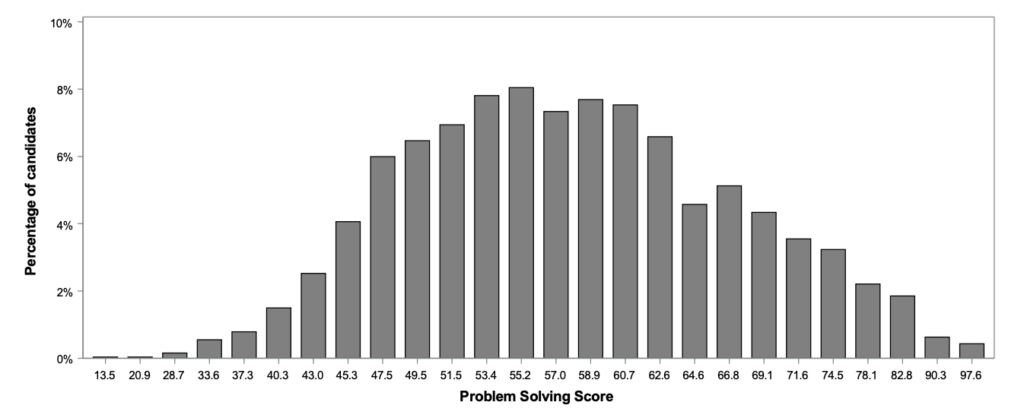
Critical Thinking
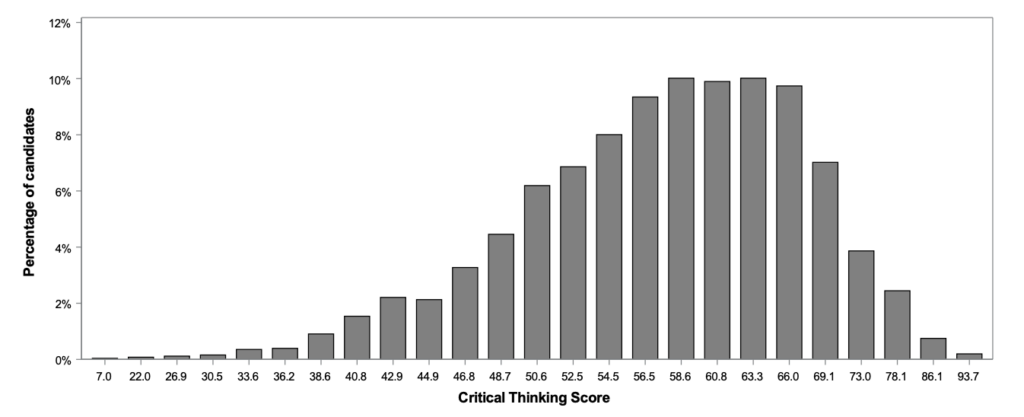
TSA Score Distributions - 2022
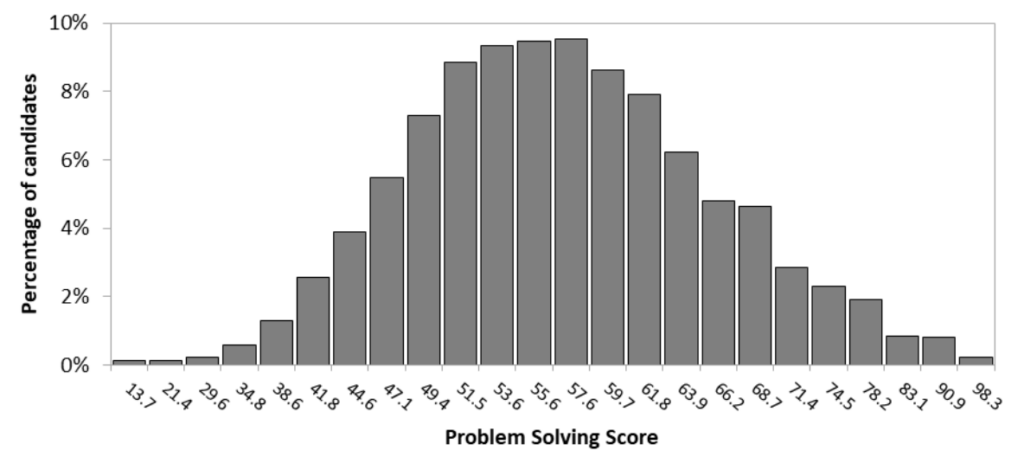
TSA Score Distributions - 2021
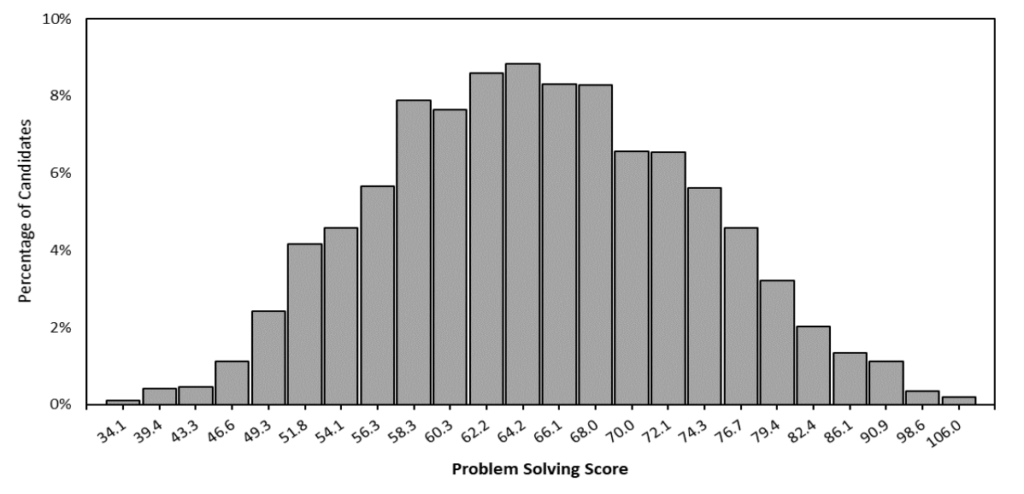
These results are what we would expect for a standard, well-balanced TSA Paper . The most common scores sit around the middle of the graphs in the 60 – 70 range , although Critical Thinking scores appear to be skewed a bit higher . However, this illusion is down to a lesser variety of scores in the higher range. Overall, these three graphs all follow the same general trend .
As we said though, there are over 10 years worth of historic results that we could go through! We won’t go through every year documented, but the results documents are available to download in our TSA Past Papers Collection if you’re interested to know how early applicants fared with the exam.
For now, though, let’s go through the previous five years of results:
TSA Score Distributions - 2020
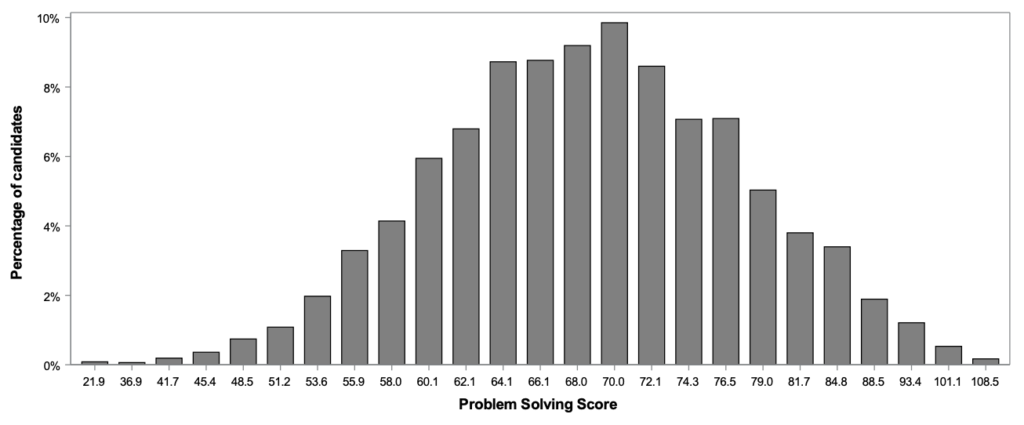
TSA Score Distributions - 2019
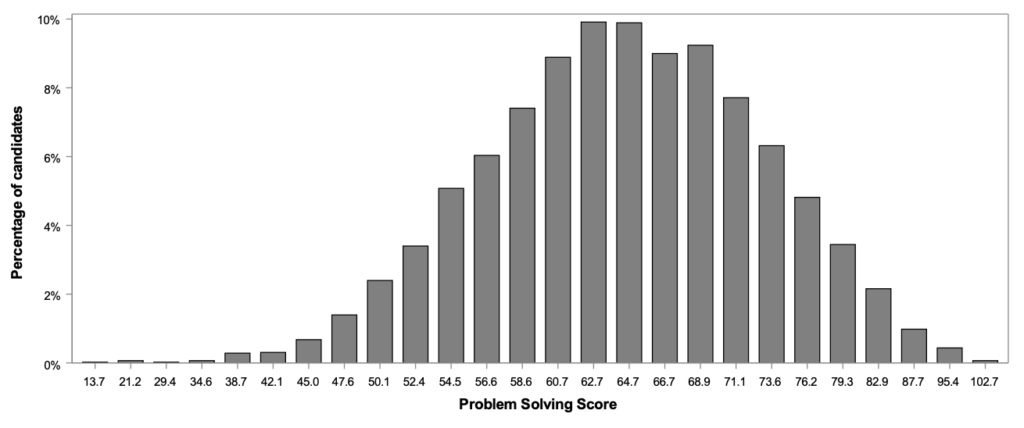
TSA Score Distributions - 2018
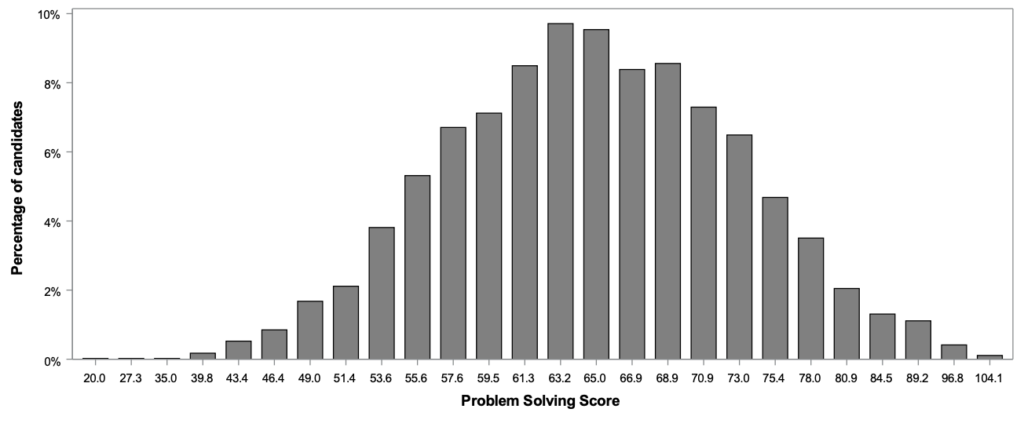
TSA Score Distributions - 2017
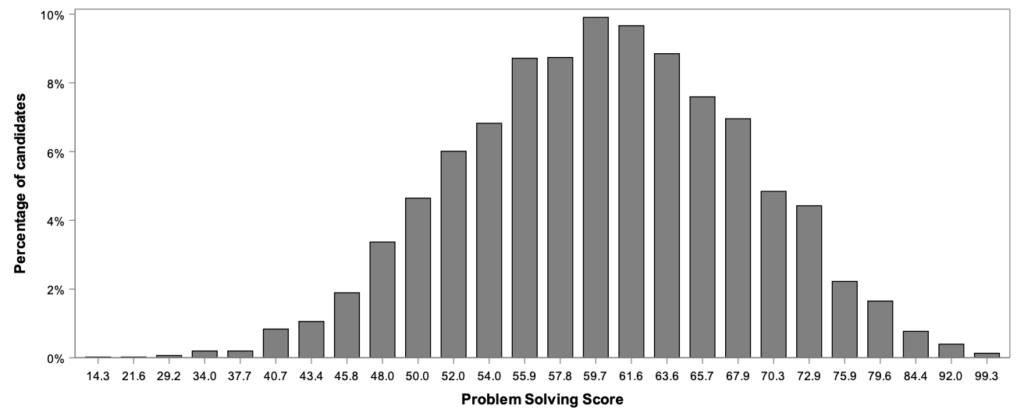
TSA Score Distributions - 2016
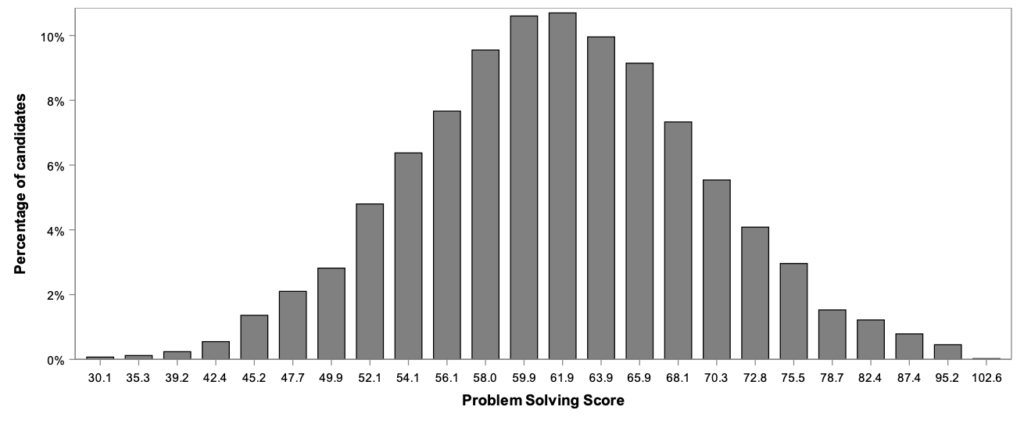
If you didn’t look closely, you could potentially assume that these graphs are all the same! However, this is a good thing as it shows just how balanced and consistent the TSA really is. That would be expected at this point though, as CAAT has had over 20 years to work on the formula and fine-tune its development methods to ensure each paper is fair and funnels in the right applicants for each course.
So most of the trends on display here are identical to what we saw in the most recent results. The only major breakaway from this pattern was in the paper for 2021 Entry , in which the Critical Thinking section scores actually did skew a bit higher than norma l, averaging in the 70 – 80 mark . Even that difference wasn’t too extreme though, so it would be safest to assume that the paper you sit will demonstrate this same trend. Your job now is to get a score on the higher end of it!
For the sake of comparison, let’s see what the results looked like back in the 2007 paper for 2008 Entry:
TSA Score Distributions - 2007

Once again, there’s nothing too crazy here. We can see that the averages are generally a bit lower this year, with the most common scores being in the 50 – 60 range overall (although Critical Thinking still skews a bit higher here). However, the balance is still pretty much the same, so it’s fair to say that even at this point, the TSA was functioning well as an admissions test .
If you’re looking to delve even further into the history of the TSA , a study was published in 2005 that covers the first few years of the exam, including the experimental process of developing it and the methods used to determine and record its reliability .
Beyond these score distributions, we have the chance to view some more specific and in-depth data thanks to the use of Freedom of Information Requests (FOI) . As universities are considered public bodies by the government, the public is able to make enquiries regarding their admissions processes , which includes providing data about their admissions test results .
Starting with Oxford , we can take a peek at how the results from individual courses looked in certain years. We, unfortunately, don’t have data for every year or every course , so we’ll just look at a couple of examples to gauge what kind of scores these courses require. Universities can easily be contacted to make FOI Requests if you wish to find out any additional information.
Let’s take Economics and Management as an example. The below table contains a wide range of Section 1 data for successful applicants of the course from 2010 Entry – 2019 Entry :
Economics and Management Oxford TSA Scores
The Minimum and Maximum scores are things we don’t get to see very often. From this data, we can see that the admissions team have an unofficial threshold range for TSA score in the high 40s and 50s rank . This isn’t to say that a lower score wouldn’t be accepted if the applicant were promising enough but the lowest score accepted here was just over 45 .
On the opposite end of the scale, we can see that only in two years did an applicant achieve full marks (or one-off from full marks depending on the conversion). Many of these maximum scores are much lower than you would initially expect , but the TSA isn’t really designed for applicants to achieve scores in the high 90s to 100s, so an applicant would need to be exceptional to get to that level.
The average scores are exactly what we would expect from the TSA considering the data we’ve already seen, with most years having an average within the high-60s to low-70s . This is also reflected in the median score.
Moving on from Oxford, we also have some data from Cambridge’s Land Economy course . Although the course no longer uses the TSA, we have data from the 2019 TSA for 2020 Entry :
Problem Solving Average Score
All Applicants: 64.2
Offer-Holders: 70.1
Critical Thinking Average Score
All Applicants: 64.5
Offer-Holders: 66.5
Overall Average Score
All Applicants: 64.1
Offer-Holders: 67.7
These averages are, once again, consistent with what we know to be an average to good TSA Score . One thing we can see from this though is that, in this specific case, the average scores between all candidates and successful candidates were not that different . Whether this is down to lower candidate numbers or higher candidate quality cannot be determined from these figures alone, but it is still interesting to think about how much better the scores of offer-holders are in comparison to the rest of the cohort.
As we said, there is plenty more data to dig through but the examples we have seen here all say very similar things; a score of between 60 and 70 is very desirable while also being the most realistic for a typical applicant .
Looking to boost your TSA Score?
TSA.Ninja is the world’s best TSA Preparation Platform which you can try today for free! Sign up now to get access to hundreds of practice questions and 19 TSA past papers!
WHAT TO DO AFTER YOU GET YOUR RESULTS
Once the TSA is finished, it will be time to think about the rest of your application, so let’s see what you’ll need to do next.
As we previously established, your TSA results are going to be sent to you around mid – January , but this is far from the end of your journey. Before you receive your results, you’ll need to contend with your interviews . You will be notified of your interview status via a letter sent in mid-November , which will confirm the time and date of your first interview which is typically set in early December (interviews are virtual for 2025 entry). Most applicants will have at least two interviews with different colleges, and you will be informed of additional interviews at least 24 hours in advance.
Oxford interviews are performed as traditional panel interviews and are generally focused on subject knowledge , so you will need to ensure you have undergone plenty of outside reading in order to prepare. Oxford will likely inform you of general topics to be discussed and should provide a reading list on which to base your preparation. You may also be asked questions about your Personal Statement, academics, TSA results and extra-curricular activities , but these will not be the primary focus. Oxford is highly focused on applicants’ academics , which means this interview structure will allow them to make the most informed decision on who they hand offers to.
Once the interviews are complete (typically around mid-December, before the holidays begin), all you will have left to do is wait for your results and continue with your academics . Thankfully, with Oxford, your wait won’t be too long as we already know TSA results are sent out in January. However, decisions for applications sent in October are released in early January each year . This is, of course, a very major piece of news to receive and will most likely overshadow your TSA results! But what do you do after you know if you got an offer or not?
Successful Applicants:
If you have received an offer , the next step is to decide if you want to accept it . If Oxford is your first choice , then you can accept the offer as your firm choice straight away. If you’re considering your other options as well though, then you should wait until they all make their decisions as well. Non-Oxbridge universities will take longer to respond to your application as the UCAS deadline isn’t until January 29th 2025 , a few days after Oxford release its decisions! You will have plenty of time to make your decision though, as the deadline for confirming your firm and insurance choices is June 6th or July 24th , depending on when your last option responds to you (these dates are for 2025 entry). Once you’ve made your decision though, you will need to respond to all of your offers on your UCAS Profile .
The final step after this is to ensure you get the grades you need . Bear in mind that only conditional offers will require you to achieve your predicted grades , but getting the best grades possible is still important even if you have an unconditional offer. Performing poorly on your final exams could potentially have a negative impact on your future .
Unsuccessful Applicants:
If you don’t receive an offer from Oxford , the process isn’t entirely finished yet . You will still need to wait for your other options to decide , meaning you have up to four more chances of success . If you do receive an offer and wish to accept it, the above process will begin . If you are only interested in attending Oxford though, your options will be very limited . Although a procedure is in place for complaints and appeals , this will only be considered in very serious cases where there is evidence of bias, discrimination or extreme error against your application.
For any other cases, the only option you will have is to reapply for the next admission cycle . This will be a long process as you’re essentially starting from scratch . You will have your end-of-year exam results to work with, but other than that you will need to start the process from the beginning. The important thing to remember is that approaching the application in the exact same way as you did before is not going to increase your chances of success . This time around, you’ll have to work harder to hone your skills and adapt to what the Oxford admissions team are looking for . Otherwise, you can expect the same result. If the TSA was an area that you struggled with, then consider seeking support for your preparation, such as the TSA.Ninja preparation platform. With TSA.Ninja, you can prepare with tutorials, practice questions, worked solutions and simulated exams , and you can try some of these features for free straight away by registering now!
At the end of the day, the NSAA is just one small, if incredibly important, part of your academic journey . This result will have a huge impact on your application but it’s not the only deciding factor behind Cambridge’s decision. Prepare for it while you have the chance, but remember that you need to strengthen your whole application in order to stand the best chance of success.
If you need reminding of the essential information about the NSAA, we would suggest checking out our NSAA Starter Guide to learn about the format, questions and test information.
Oxford TSA Results 2023 – The Definitive Guide to your TSA Score
Tsa section 2: the definitive guide to section 2 of the tsa 2024, tsa preparation: your 6-month tsa preparation timeline, the ultimate guide to problem solving in tsa section 1, the definitive guide to tsa section 1: critical thinking, your definitive guide to choosing ecaa or tsa.
Worried about your TSA Score? Exams.Ninja will help you get the results you need!
When you register for the TSA.Ninja Preparation Platform , you’ll be able to boost your practice. Plus, you can upgrade to access everything you need for TSA success :
Training Temple – Learn about the theory behind the TSA with our extensive collection of expert tutorials .
Practice Dojo- Work through over 500 TSA questions to prepare yourself for everything in the test. Each question has a worked solution and you can customise each practice session to suit your needs.
Exam Arena- Test your skills with our realistic exam simulator . You can access every past paper and get an accurate result once you’re done!
Start your free demo now to begin your journey to TSA success!

Need any help? Contact us at: [email protected] .
Exams Ninja 2024. All Rights Reserved. T&C. Cookie Policy. Privacy Policy.

IMAGES
VIDEO
COMMENTS
The Thinking Skills Assessment (TSA) is divided into two parts: a 90-minute, multiple-choice Thinking Skills Assessment and a 30-minute writing task. If you are applying for one of the following courses you will be required to take both sections of the TSA: Psychology, Philosophy and Linguistics . However, if you are applying for Economics and ...
The TSA is a critical component of the Oxford University selection process for various degree programmes, designed to evaluate a candidate's critical thinking, problem-solving, and analytical skills—essential qualities for thriving in the rigorous academic environment of Oxford.
The Oxford Thinking Skills Assessment (TSA) is a critical part of the application process for several courses at the University of Oxford. It's a unique test designed to assess your problem-solving and critical thinking skills, both of which are essential for success in higher education. The TSA is divided into two parts: a 90-minute, multiple ...
This TSA Test Guide Is Written By One Of U2's Experimental Psychology, University of Oxford Graduates and TSA Tutors. We Offer Top Tips For Preparation For The TSA Exam - How To Approach The TSA, How To Structure Preparation, Key Aspects Of Critical Thinking And Problem Solving, And TSA Exam Technique.
The TSA Oxford (Thinking Skills Assessment) is a pre-interview written test designed to help university tutors assess whether you would perform well at their course. It's not based upon any specific subject but rather tests applicants on a variety of general skills that are transferable between many different subjects.. The TSA Oxford is sat in mid October and must be taken at an authorised ...
Microsoft Word - ATSTSTSAOXS121T121.1957114040. Thinking Skills Assessment Oxford. 4502/11. November 2021. 1 hour 30 minutes. SECTION 1. INSTRUCTIONS TO CANDIDATES. Please read this page carefully, but do not open the question paper until you are told that you may do so. This paper is Section 1 of 2.
The test itself is split into two parts: a 90-minute, multiple-choice Thinking Skills Assessment and a 30-minute writing task. ... TSA Oxford Section 1 Critical Thinking Scores 2023. The average scores for Section 1 will of course vary from year to year but will typically sit around 65 points for both, ...
The Thinking Skills Assessment (TSA) is an aptitude test taken by students who are applying to certain courses at Oxford. In this article, we outline the format of the exam, who needs to sit the test and why it's an important part of the admissions process.
The TSA (Thinking Skills Assessment) is a key part of Oxford and UCL admissions for those hoping to study subjects including PPE and Psychology. The written exam tests many of the skills required to succeed whilst at Oxford like communication ability, writing skills as well as critical thinking skills; the latter will be the focus of this article.
The Thinking Skills Assessment is a paper-based test, divided into two parts: a 90-minute, multiple-choice Thinking Skills Assessment and a 30-minute writing task. ... 'How to Beat the TSA!!' (Jesus College Oxford) ... Some A-level Critical Thinking questions, which are designed to test similar skills to the Critical Thinking questions in ...
The Thinking Skills Assessment (TSA) is a 90-minute - 2-hour long test that is used by the University of Oxford and University College London.It covers a large variety of subjects, from Psychology to PPE, so the content of the exam isn't subject-specific.. There are two Sections in the TSA, the 90-minute multiple-choice section (Section 1) and the 30-minute essay writing section (Section 2).
Thinking Skills Assessment. The Thinking Skills Assessment ( TSA) is a generic admissions test, which is used as part of the admissions process for entry to some undergraduate courses at the University of Cambridge, the University of Oxford, Hanoi University of Science and Technology, and formerly, University College London .
The two sections are very different, testing distinct thinking skills and challenging a student's ability to organize ideas, use critical thinking skills, and find reason in language. Section 1 of Oxford's TSA. The first section of Oxford's TSA has a total of 50 multiple-choice questions.
The Thinking Skills Assessment (TSA) is an exam used for undergraduate admissions to some courses at Oxford. It has two sections. Section 1 is multiple choice and tests critical thinking and problem solving, and Section 2 is an argumentative essay.
TSA Critical Thinking questions require you to understand the constituents of a good argument and be able to pick them apart. The majority of TSA Critical thinking questions tend to fall into 5 major categories, let's take a deep dive into each category. ... UCL only uses Section 1 of the TSA, whereas Oxford uses Section 1 and 2 for the ...
It is a rite of passage for potential scholars. Designed to gauge your critical thinking and problem-solving abilities, this assessment stands as a testament to your readiness for rigorous academic challenges. The reason why the TSA is held in such high regard is Simple. In a world teeming with information, universities like Oxford, Cambridge ...
Thinking Skills Assessment (TSA) 2021 . Question Answer Question Answer 1 D 26 E 2 B 27 B 3 D 28 D 4 B 29 C 5 D 30 C 6 D 31 D 7 E 32 E 8 D 33 A 9 C 34 E ... Critical Thinking raw score . Critical Thinking reported score ; Problem Solving raw score . Problem Solving reported score 25 99.4 25 106.0
The Oxford TSA (Oxford Thinking Skills Assessment) is an admissions exam designed to rank the applicants to various courses at the University of Oxford to help admissions tutors separate excellent candidates from one another as part of the admissions test. ... and logical thinking, whilst the other 25 are critical thinking questions, including ...
Section 1 - Critical Thinking Score. ... Assessment, but are sent to admissions tutors, together with details of scores on Section 1. Use of TSA Oxford Results TSA Oxford helps admissions tutors to assess whether candidates have the skills and aptitudes that are required to study at the highest level - for example, the ability to think ...
Section 2 of the TSA is a 30-minute essay writing task, requiring you to answer a broad question that requires you to present an argument with reasoning and critical thinking.An essay is, of course, much more difficult to mark when compared to multiple-choice questions, as there is much more room for subjective interpretation.Therefore, there is no official scoring system in place for the essay.